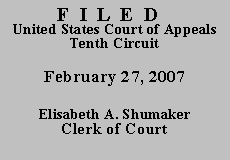

| UNITED STATES OF AMERICA, |
|
| v. | |
| SHAWN SCHILLINGER ALLRED, |
On appeal, he contends the district court erred by applying the fifteen-year mandatory minimum sentence contained in 18 U.S.C. § 924(e)(1) for individuals convicted under 18 U.S.C. § 922(g) who have been previously convicted of three or more violent felonies. He argues he has not been convicted of three prior violent felonies.
Allred acknowledges that he has two previous violent felony convictions. He argues, however, that the third prior conviction used by the court--a Utah conviction for burglary of a non-dwelling--was not a "violent felony" under 18 U.S.C. § 924(e)(2)(B) and Taylor v. United States, 495 U.S. 575, 599 (1990).(1)
Even if Allred's argument had merit, any error in the application of § 924 was harmless because § 924 did not affect Allred's sentence.
Federal Rule of Criminal Procedure 52(a) requires us to disregard any claimed error that does not affect substantial rights. "An error with respect to sentencing does not affect substantial rights when it did not affect the sentence imposed by the district court." United States v. Ollson, 413 F.3d 1119, 1120 (10th Cir. 2005). The judge's reasoning during the sentencing hearing makes clear that Allred would have received the same sentence--188 months--even if the § 924 mandatory minimum of 180 months did not apply.
At sentencing, the district court started with a United States Sentencing Guidelines range of 262 to 327 months based on Allred's offense level and criminal history. The court then offered to let Allred accept responsibility to "reduce the range from a low end of 262 to a low end of 188." R. Vol. IV at 9. Although the court also believed at sentencing that the mandatory minimum penalty under § 924 would apply, in the end, the fifteen-year minimum did not factor into the calculation of Allred's sentence. Instead, the court based its sentence entirely on the advisory Guidelines. As the court noted at sentencing, "The guidelines indicate a sentence of above 15 years even with the acceptance of responsibility." R. Vol. IV at 15. The court ultimately rejected Allred's request to base his sentence on the fifteen-year mandatory minimum rather than the Guidelines.
Allred has not challenged the judge's application of the Guidelines to his case. Because the judge calculated the sentence based on the Guidelines and not on § 924, any error regarding § 924 is harmless. Finally, although Allred does not attack the reasonableness of his sentence, the record is clear that the district court evaluated the sentencing factors contained in 18 U.S.C. § 3553(a) in imposing the sentence.
Because we see no error in the sentence, we AFFIRM.
Entered for the Court
Timothy M. Tymkovich
Circuit Judge
*. This order and judgment is not binding precedent except under the doctrines of law of the case, res judicata and collateral estoppel. It may be cited, however, for its persuasive value consistent with Fed. R. App. P. 32.1 and 10th Cir. R. 32.1.
2. After examining the briefs and the appellate record, this three-judge panel has determined unanimously that oral argument would not be of material assistance in the determination of this appeal. See Fed. R. App. P. 34(a); 10th Cir. R. 34.1(G). The cause is therefore ordered submitted without oral argument.
1. A violent felony under 18 U.S.C. § 924(e)(2)(B) is "any crime punishable by imprisonment for a term exceeding one year . . . that (i) has as an element the use, attempted use, or threatened use of physical force against the person of another; or (ii) is burglary, arson, or extortion, involves use of explosives, or otherwise involves conduct that presents a serious potential risk of physical injury to another." The Supreme Court held that "any crime . . . having the basic elements of unlawful or unprivileged entry into, or remaining in, a building or structure, with intent to commit a crime" is a "generic burglary" that qualifies as a violent felony under the 18 U.S.C. § 924 definition. Taylor, 495 U.S. at 599. Allred argues that the broad definitions of "building" and "entry" in the Utah burglary statute bring it outside the Taylor definition of "generic burglary" and require the government to show that his conduct actually met the definition of a violent felony described in Taylor. We note a panel of this court has held in an unpublished decision that the Utah statute meets the "generic burglary" definition in Taylor. United States v. Blanco-Munoz, No. 98-4094, 1999 WL 300662 (10th Cir. May 13, 1999). See also United States v. DeCarlo, 88 F. App'x 707 (5th Cir. 2004) (reaching same conclusion).